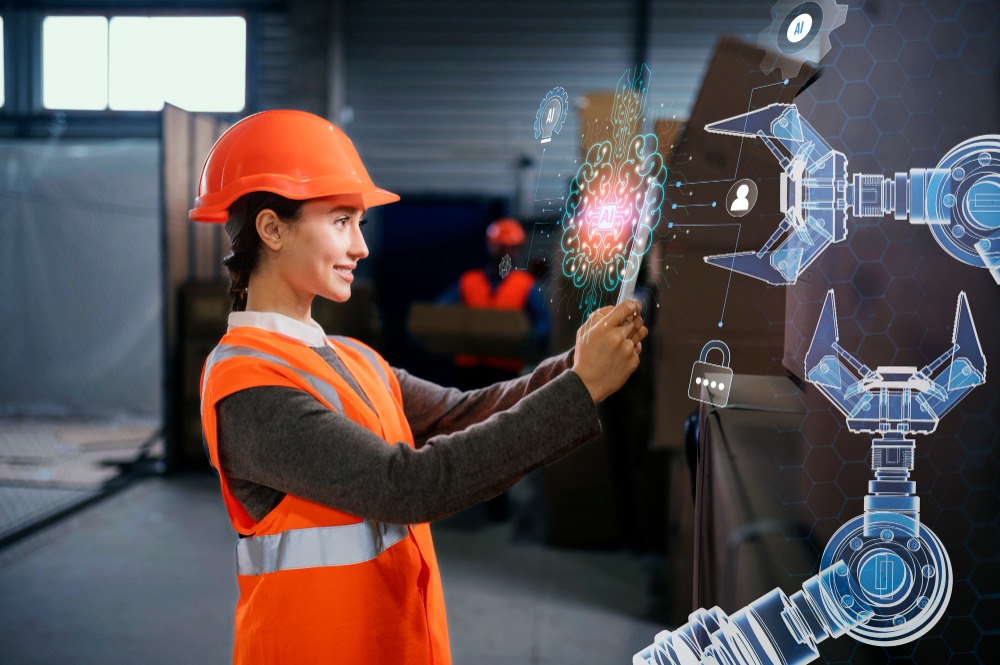Introduction
As we venture into 2024, the realm of artificial intelligence (AI) continues to expand, touching virtually every sector of the global economy. From enhancing efficiency in production lines to revolutionizing the way we access healthcare, AI’s applications are as diverse as they are groundbreaking. This exploration delves into the latest and most impactful uses of AI across various industries, shedding light on how this technology is driving innovation and reshaping business landscapes. As AI systems grow more sophisticated, their potential to solve complex problems and unlock new opportunities becomes increasingly evident. In this context, understanding the latest applications of AI not only provides insights into where technology is headed but also offers a glimpse into the future of industry trends.
Overview of Artificial Intelligence Applications Across Industries
The adoption of artificial intelligence (AI) across various sectors has skyrocketed in recent years, transforming the way businesses operate and delivering unprecedented efficiency and innovation. As we delve into the specifics, it becomes clear that AI’s flexibility and adaptability have opened new avenues for its application, streamlining processes, enhancing decision-making, and personalizing customer experiences.
Healthcare
In healthcare, AI’s impact is profound, ranging from patient diagnostics to treatment plans and operational efficiencies. AI algorithms are increasingly used to analyze complex medical data at a speed and accuracy that surpasses human capabilities. This includes everything from interpreting X-rays and MRI scans to identifying signs of diseases such as cancer in their early stages. AI is also at the forefront of personalizing patient care through predictive analytics, tailoring treatment plans based on an individual’s unique health profile. Additionally, AI-powered chatbots and virtual health assistants are revolutionizing patient engagement and care delivery, providing 24/7 assistance and support.
Finance
The financial industry has been one of the early adopters of AI, leveraging its potential to enhance customer service, risk management, and fraud detection. AI algorithms are now integral in analyzing market trends and predicting stock performance with a high degree of accuracy, empowering investors with actionable insights. In terms of customer experience, AI-driven virtual assistants and chatbots are providing personalized financial advice and assistance, making banking more accessible. Furthermore, AI’s advanced pattern recognition capabilities have significantly improved the detection and prevention of fraudulent transactions, safeguarding both the institutions and their clientele.
Emerging Trends in AI Applications
As we move further into the 21st century, AI continues to evolve, introducing new trends and applications across different sectors. Industries that were once considered traditional and slow to adapt are now embracing AI, unlocking new potentials and reshaping their future landscape.
Retail
In the retail industry, AI is revolutionizing the way businesses understand and interact with their customers. Personalized shopping experiences powered by AI are becoming the standard, with algorithms analyzing a customer’s shopping history and preferences to make tailored product recommendations. Inventory management has also seen significant improvements, with AI predicting stock levels more accurately and optimizing supply chain logistics. Moreover, AI-enabled robots are being deployed in warehouses for sorting and transporting goods, dramatically increasing efficiency and reducing operational costs.
– Personalized Customer Experiences
– Predictive Inventory Management
– AI-Enabled Robots for Warehousing
Manufacturing
The manufacturing sector is witnessing a renaissance thanks to AI, with smart factories becoming the new norm. These factories are equipped with AI-powered machines that can predict maintenance needs, preventing downtime and saving costs. Quality control has also been enhanced, with AI systems capable of detecting defects with greater accuracy than human inspectors. Furthermore, AI is facilitating the move towards more flexible and efficient production lines, capable of quickly adapting to new product demands without significant reconfiguration.
– Smart Factories and Predictive Maintenance
– Enhanced Quality Control
– Flexible and Efficient Production Lines
Entertainment
AI’s foray into the entertainment industry is reshaping content creation and consumption. Streaming services are using AI to analyze viewing habits and make personalized content recommendations, ensuring users find content that matches their tastes with uncanny accuracy. In film and music production, AI is being used to generate new compositions and even create realistic CGI characters, opening new creative possibilities. Social media platforms are also leveraging AI to curate user feeds and moderate content, ensuring a more engaging and safe user experience.
– Personalized Content Recommendations
– AI in Film and Music Production
– Content Moderation on Social Media Platforms
As we explore the landscape of artificial intelligence applications across industries in 2024, it’s evident that AI’s influence is vast and still growing. From transforming patient care in healthcare to revolutionizing inventory management in retail, AI’s applications are diverse and impactful. Emerging trends in AI applications hint at even more exciting developments, with retail, manufacturing, and entertainment industries poised to benefit greatly from AI’s continued evolution. As technology advances, so too will the ways in which businesses leverage AI, leading to more innovation, efficiency, and personalized experiences across the board.
Challenges and Opportunities in Integrating AI Across Industries
The rise of Artificial Intelligence (AI) across various industries signals not just a technological revolution but also introduces a complex blend of challenges and opportunities. As organizations strive to harness the power of AI to enhance operational efficiency, customize user experiences, and open new avenues for innovation, they must navigate through an intricate landscape. This integration, while promising, surfaces significant issues related to data privacy and skill gaps in the workforce, alongside presenting opportunities for growth and advancement.
Data Privacy Concerns
One of the foremost challenges in the widespread adoption of AI is the concern around data privacy. AI systems require vast amounts of data to learn, adapt, and evolve. This dependence raises critical questions about the security and privacy of personal and sensitive information. In industries such as healthcare and banking, where data sensitivity is paramount, the fear of data breaches can hinder AI integration. Moreover, compliance with strict regulatory standards like the General Data Protection Regulation (GDPR) in the European Union adds layers of complexity.
– Regulatory compliance becomes a significant hurdle, demanding robust data handling and protection protocols.
– There’s an ever-present fear among consumers about misuse of their personal data, weakening their trust in AI-driven systems.
Such challenges compel industries to prioritize data protection measures and to be transparent about their data use policies, thus turning these issues into opportunities to build trust and reinforce security protocols.
Skill Gap in Workforce
Another critical challenge in leveraging AI’s full potential across industries is the glaring skill gap in the current workforce. As AI continues to evolve, the need for specialized knowledge and skills to develop, manage, and interpret AI systems grows exponentially. However, the fast pace of AI development outstrips the rate at which the workforce can adapt.
– Many industries find themselves facing a shortage of skilled AI professionals capable of bridging the gap between advanced AI technologies and practical, everyday applications.
– The rapid evolution of AI technologies means what was learned yesterday might become obsolete tomorrow, adding to the challenge of continuous education and adaptation.
Nonetheless, this skills gap also uncovers an array of opportunities:
– It stimulates educational institutions and training programs to update and expand their curricula, focusing on AI and its applications across various sectors.
– Companies are increasingly investing in training and development programs for their existing employees, preparing them for an AI-centric future.
– This scenario also encourages a more collaborative approach where companies partner with academic institutions and tech firms to nurture a new generation of AI-savvy professionals.
In conclusion, the integration of AI across industries brings forth a complex matrix of challenges and opportunities. Addressing concerns regarding data privacy and the workforce skill gap is crucial for the sustainable and ethical development of AI technologies. By converting these challenges into opportunities for improvement and growth, industries can pave the way for a future where AI not only optimizes operations but also innovates solutions for complex problems.
Future Prospects and Predictions for AI Applications in 2024
As we gaze into the horizon of 2024, artificial intelligence (AI) stands at the cusp of transforming industries in unprecedented ways. The trajectory of AI development suggests a future where its integration becomes more seamless, predictive capabilities more accurate, and applications even broader. Here, we explore key predictions for AI applications in the year ahead.
One of the most anticipated advancements is the evolution of AI in healthcare. Beyond diagnostic assistance, AI is expected to power remote patient monitoring systems, enabling real-time, personalized healthcare recommendations. Telemedicine, powered by AI, could extend its reach, making healthcare accessible in remote regions.
In the realm of entertainment and media, AI is poised to revolutionize content creation and consumption. The prediction is that AI will foster more interactive and customized entertainment experiences, with algorithms predicting user preferences with higher accuracy.
The automotive industry is another area ripe for AI-led transformations. Autonomous driving technology is anticipated to reach new milestones, with improvements in safety and navigation capabilities. Furthermore, AI could lead to more efficient manufacturing processes, reducing costs and environmental impact.
Education is yet another sector where AI’s impact is expected to grow. Personalized learning experiences, powered by AI, could become the norm, adapting to the individual learning pace and style of each student. This might significantly reduce the educational gap and enhance global learning outcomes.
In conclusion, as we look towards 2024, the potential applications of AI across various industries paint a promising picture. From revolutionizing healthcare and entertainment to transforming the automotive and education sectors, AI is set to deepen its impact, making services more accessible, efficient, and tailored to individual needs. The future of AI applications is not just about technological advancement but also about the profound societal changes these technologies will bring.


